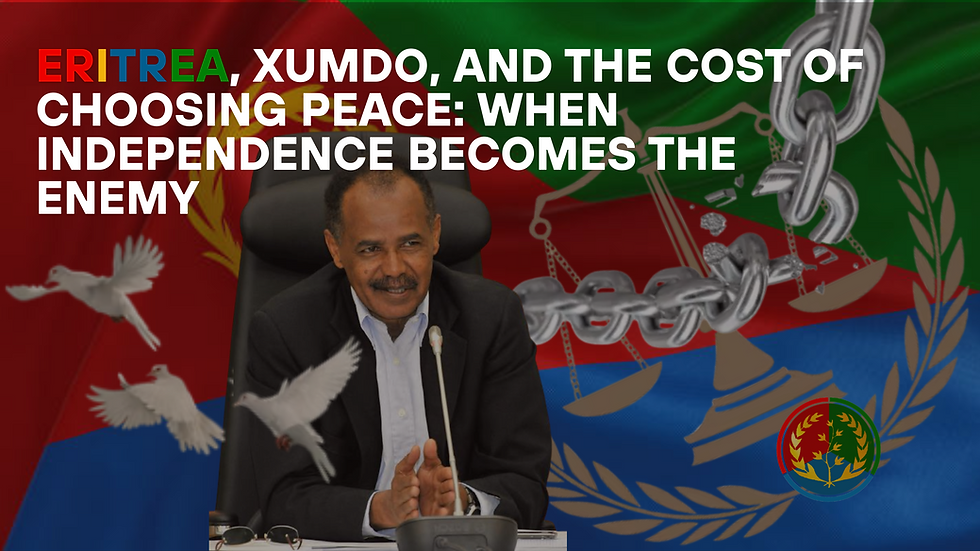Baiting a War: Ethiopia’s Escalating Provocations Against Eritrea and the Truth Behind the Afar Ploy
- Nakfa Eritrea
- May 3, 2025
- 3 min read
A Pattern of Hostility Disguised as National Security
In recent months, Ethiopia’s government has intensified its hostile rhetoric toward Eritrea—this time under the guise of “retrieving Afar refugees” who fled across the northern border into Eritrean territory. The threat to breach Eritrean sovereignty under such a flimsy pretext is not only reckless but deeply revealing. It is the latest episode in a long line of provocations aimed at destabilizing a nation that has refused to bow to external domination, Western financial entrapment, or regional puppetry.
At first glance, Ethiopia’s claim might sound like a localized ethnic issue. But beneath the surface, this is a calculated geopolitical tactic—one meant to bait Eritrea into a war it has not sought, draw regional attention away from Ethiopia’s internal fragmentation, and reassert control over narratives in the Horn of Africa.
The Afar people, a transnational ethnic group indigenous to Eritrea, Ethiopia, and Djibouti, are not political pawns to be used as pretexts for war. Their movement across borders is not new, and their desire to seek refuge in Eritrea is an indictment of the conditions they face in Ethiopia—not an act of rebellion or betrayal. Yet, rather than taking responsibility for the conditions that forced Afars to flee, Ethiopia is escalating tensions, targeting Eritrea for doing what any responsible neighbor would: offering shelter.
From Tigray to Oromia—Why Ethiopia Needs a Scapegoat
The reality is that Ethiopia today stands on a crumbling foundation. From the brutal Tigray war to ongoing violence in Oromia and Amhara, the regime in Addis Ababa has failed to provide stability, justice, or prosperity to its diverse population. With inflation soaring, civil unrest rising, and regional power shifting, Abiy Ahmed’s administration is desperate to redirect national frustration outward—toward a convenient external “threat.”
Eritrea, having withstood decades of sanctions, war, and propaganda without surrendering its independence, represents everything the West—and by extension, their Ethiopian partners—cannot control. It is a sovereign nation that has refused IMF handouts, maintained its territorial integrity, and resisted foreign military installations. For these reasons, Eritrea remains a target not only of Ethiopia’s aggression but of broader Western containment efforts.
By framing Eritrea as a destabilizer or aggressor, Ethiopia seeks to reclaim international favor—especially as it loses moral high ground due to its own war crimes and censorship. Threatening to cross into Eritrean territory in pursuit of “Afar refugees” is meant to provoke a defensive response, one that could then be used to label Eritrea the aggressor in international forums.
This is not a border crisis. This is a psychological operation.
A Manufactured Pretext for International Involvement
This strategy mirrors classic Western proxy playbooks. Throughout modern African history, we’ve seen foreign-backed regimes manufacture border or ethnic crises to justify external intervention, economic sanctions, or the weakening of neighboring sovereign states. Ethiopia’s latest maneuver appears to follow this very model.
By creating a crisis where none exists, Ethiopia can:
-Call for mediation or UN “monitoring” missions at the border.
-Undermine Eritrea’s stability and reputation.
-Justify increased military spending or deployment along the border.
-Distract its own population from internal uprisings and failures.
Eritrea has not issued threats, has not violated Ethiopian territory, and has no interest in reigniting war. But what Ethiopia hopes for is a reaction—because only through a conflict can it regain its slipping grip on international relevance and domestic unity.
And let's be clear: any nation that threatens to enter another’s borders uninvited—especially under false pretenses—is not preserving peace. It is inciting war. The fact that the Afar people feel safer in Eritrea than in their own country should be the real story. But that truth is inconvenient for those who benefit from chaos.
Sovereignty, Smokescreens, and the Need for Regional Clarity
Eritrea’s refusal to be baited is not weakness—it is wisdom. It understands the game at play. Just as it did in 1998, 2001, and even during the Tigray conflict, Eritrea is being painted into a corner for defending its autonomy. The question now is: will the African Union, neighboring countries, and the international community continue to be silent as Ethiopia threatens yet another border war?
It’s time to ask:
-Why is Ethiopia focusing on Eritrea while ignoring its own internal displacement and ethnic cleansing?
-Why are the Afar fleeing, and why is their safety not a concern until they cross a border?
-Who stands to benefit from another war in the Horn of Africa?
Eritrea has spent decades building a path of self-reliance, national cohesion, and international respect. Attempts to destroy that model—whether through war, propaganda, or proxy alliances—will ultimately fail. The world must see Ethiopia’s threats for what they are: a smokescreen for internal collapse and a desperate move to silence the example Eritrea sets.
The Afar refugees deserve safety. Eritrea deserves peace. And Ethiopia must be held accountable—not for losing Afars to safety, but for creating the conditions that pushed them away in the first place.
.png)



Comments